

12 questions sur l’état de la recherche scientifique sur l’impact des TIC sur la motivation à apprendre. Les digital natives : mais qui sont-ils vraiment ? The Center for Teaching History with Technology. Center for Scholarly Communication & Digital Curation. A Guide to Digital Humanities. Writing History in the Digital Age » Conclusions: What We Learned. What have we learned from creating this collective work of scholarship on the web?
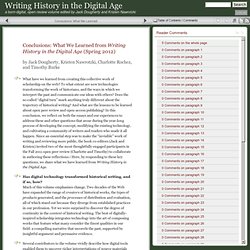
To what extent are new technologies transforming the work of historians, and the ways in which we interpret the past and communicate our ideas with others? Does the so-called “digital turn” mark anything truly different about the trajectory of historical writing? And what are the lessons to be learned about open peer review and open-access publishing? In this conclusion, we reflect on both the essays and our experiences to address these and other questions that arose during the year-long process of developing the concept, modifying the existing technology, and cultivating a community of writers and readers who made it all happen. Has digital technology transformed historical writing, and if so, how?
Images numériques. Histoire-Hypermédia - Utiliser les instruments informatisés. Utiliser les moyens informatisés : quelques conseils pour une exploitation efficace Donald FYSON Introduction Nous sommes tous habitués à utiliser les moyens informatisés pour recueillir l'information, qu'il s'agisse d'une recherche dans Google ou d'une consultation de Wikipedia.
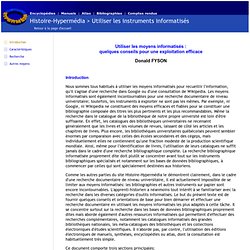
Les moyens informatisés sont également incontournables pour une recherche documentaire de niveau universitaire; toutefois, les instruments à exploiter ne sont pas les mêmes. Par exemple, ni Google, ni Wikipedia ne constituent des moyens efficaces et fiables pour se constituer une bibliographie composée des titres les plus pertinents et les plus recommandables. Comme les autres parties du site Histoire-Hypermédia le démontrent clairement, dans le cadre d'une recherche documentaire de niveau universitaire, il est actuellement impossible de se limiter aux moyens informatisés: les bibliographies et autres instruments sur papier sont encore incontournables. Ce document comporte trois sections principales: 1. Omeka.net.
Making Sense of Evidence. Making Sense of Evidence This section helps students and teachers make effective use of primary sources.
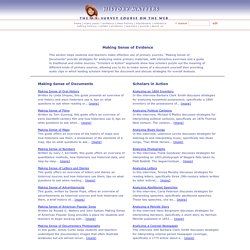
“Making Sense of Documents” provide strategies for analyzing online primary materials, with interactive exercises and a guide to traditional and online sources. “Scholars in Action” segments show how scholars puzzle out the meaning of different kinds of primary sources, allowing you to try to make sense of a document yourself then providing audio clips in which leading scholars interpret the document and discuss strategies for overall analysis.
History Meets High-Tech: Digital Humanities. Manifeste des Digital humanities. Contexte Nous, acteurs ou observateurs des digital humanities (humanités numériques) nous sommes réunis à Paris lors du THATCamp des 18 et 19 mai 2010.
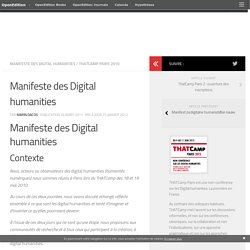
Au cours de ces deux journées, nous avons discuté, échangé, réfléchi ensemble à ce que sont les digital humanities et tenté d’imaginer et d’inventer ce qu’elles pourraient devenir. À l’issue de ces deux jours qui ne sont qu’une étape, nous proposons aux communautés de recherche et à tous ceux qui participent à la création, à l’édition, à la valorisation ou à la conservation des savoirs un manifeste des digital humanities. I. Définition 1. 2. 3. Where’s the Beef? Does Digital Humanities Have to Answer Questions? The criticism most frequently leveled at digital humanities is what I like to call the “Where’s the beef?”
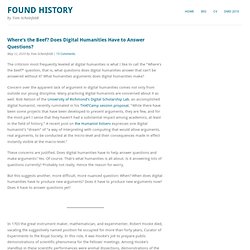
So You Want a DH Job? Interviewing, Pt 2. Facebook Delicious Google Bookmarks MySpace Messenger Yesterday I blogged about how flustered and frustrated I was at MLA this year to have three separate people from three major universities where hiring was being done aggressively complain about the quality of some Digital Humanities job candidates, not on paper but in their self-presentation at interviews. In one case, I'm sure there was some prejudice against the field. In the other two cases, it was non-DH scholars who were highly, even assertively receptive to the field and fostered students, undergrad and grad, in this area. My frustration was in realizing, belatedly, that HASTAC should be taking up the challenge of multi-disciplinary DH career building. We need a forum, where those in different disciplines can talk about what does or does not work at an interview for a promising DH scholar.
CHNM- Children and Youth in History. Exploring the History Web. Promises and Perils of Digital History. Tep back in time and open the pages of the inaugural issue of Wired magazine from the spring of 1993, and prophecies of an optimistic digital future call out to you.
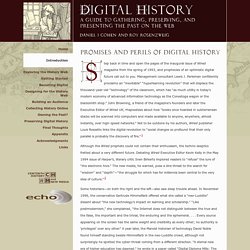
Management consultant Lewis J. Perleman confidently proclaims an “inevitable” “hyperlearning revolution” that will displace the thousand-year-old “technology” of the classroom, which has “as much utility in today’s modern economy of advanced information technology as the Conestoga wagon or the blacksmith shop.” John Browning, a friend of the magazine’s founders and later the Executive Editor of Wired UK, rhapsodizes about how “books once hoarded in subterranean stacks will be scanned into computers and made available to anyone, anywhere, almost instantly, over high-speed networks.” Not to be outdone by his authors, Wired publisher Louis Rossetto links the digital revolution to “social changes so profound that their only parallel is probably the discovery of fire.”1.